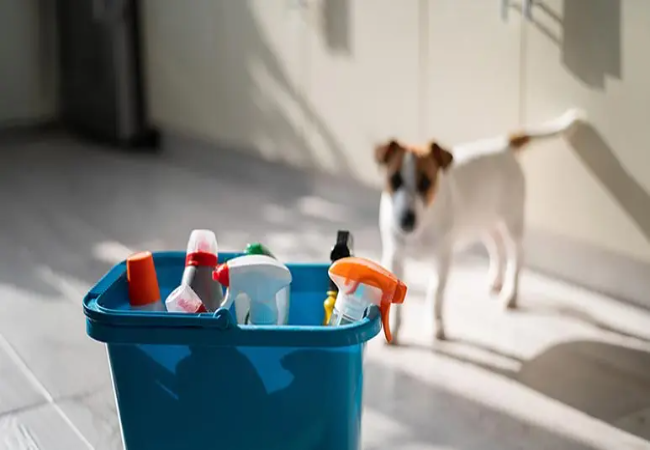Cleaning Products That Harm Pets in 2025: Vet Safe Tips & Alternatives🐾

In this article
Cleaning Products That Harm Pets in 2025: Vet Safe Tips & Alternatives🐾
By Dr. Duncan Houston BVSc
🔍 Why It Matters
Household cleaners are essential—but many contain chemicals that are toxic to pets. Dogs and cats often explore with their noses and paws, increasing their risk of exposure through skin contact, inhalation, or ingestion.
Even inhaled fumes (from ammonia or bleach) can harm sensitive respiratory systems, especially in cats.
⚠️ Common Toxic Ingredients
- Ammonia (e.g., window, oven cleaners): irritates skin, eyes, lungs.
- Bleach/Chlorine: causes GI burns, vomiting, respiratory damage.
- Phenols/Disinfectants (Lysol, quats): harm liver, kidneys; irritate skin and lungs.
- Formaldehyde: found in laundry and bathroom cleaners; carcinogenic and irritant.
- Isopropyl alcohol: from sanitizers and electronics cleaners; causes vomiting, CNS depression.
- Phthalates & fragrance chemicals: hormone disruptors—linked to tumors and reproductive issues.
- Essential oils (tea tree, eucalyptus, lavender): toxic to cats and dogs—can damage liver and cause life-threatening effects.
🚨 Signs Your Pet May Be Affected
- Drooling, pawing at face, vomiting, diarrhea ± abdominal pain
- Lethargy, disorientation, seizures, and coma in severe cases.
- Sneezing, coughing, watery eyes, open-mouth breathing.
- Skin redness, chemical burns, and blisters from topical contact.
🛡️ Prevention Tips
- Store cleaners securely and out of sight of pets.
- Keep pets out of rooms during cleaning and until surfaces dry and are ventilated.
- Avoid mixing bleach/acid or bleach/alcohol—this can release deadly gases.
- Check labels: skip products with quats, phenols, formaldehyde, or phthalates.
- Choose unscented, plant-based or pet-safe enzyme cleaners for messes.
✔️ Vet‑Approved Cleaner Alternatives
- Enzymatic cleaners: safe for urine/vomit/feces—biodegradable and non-toxic.
- Vinegar + water (diluted): effective general cleaner; strong smell dissipates.
- Baking soda: gentle abrasive for scrubbing; safe on most surfaces.
- Diluted hydrogen peroxide: disinfects without harsh chemicals; avoid mixing with bleach.
- Eco-friendly cleaners (Simple Green, Attitude): biodegradable, pet-safe, avoid toxic additives.
- Unscented dish soap: mild formula for routine light cleaning.
🧸 How Ask A Vet,
- 🩺 Ask A Vet: On‑demand guidance for accidental exposure, cleaning advice, and safe-product recommendations
📋 Emergency Response Checklist
| Step | Action |
|---|---|
| 1 | Secure pet and remove from contamination area |
| 2 | Rinse skin or paws with water; ventilate area |
| 3 | Call vet or Poison Hotline (855‑764‑7661 / 888‑426‑4435) |
| 4 | Have product label info ready |
| 5 | Follow professional advice on monitoring or treatment |
🎯 Final Thoughts
Cleaning your home shouldn’t place your pets at risk. By identifying harmful ingredients—such as bleach, ammonia, phenols, quats, phthalates, and essential oils—and choosing pet-safe alternatives like enzymatic cleaners, vinegar, and eco-friendly solutions, you can protect their health. Always use good ventilation, secure storage, and vet guidance in case of exposure. Clean smart—and keep companions safe 🐶🐱.
— Dr Duncan Houston, BVSc
Need help choosing safe cleaners or managing accidental exposure? Visit AskAVet.com or download the Ask A Vet app for expert support anytime.






